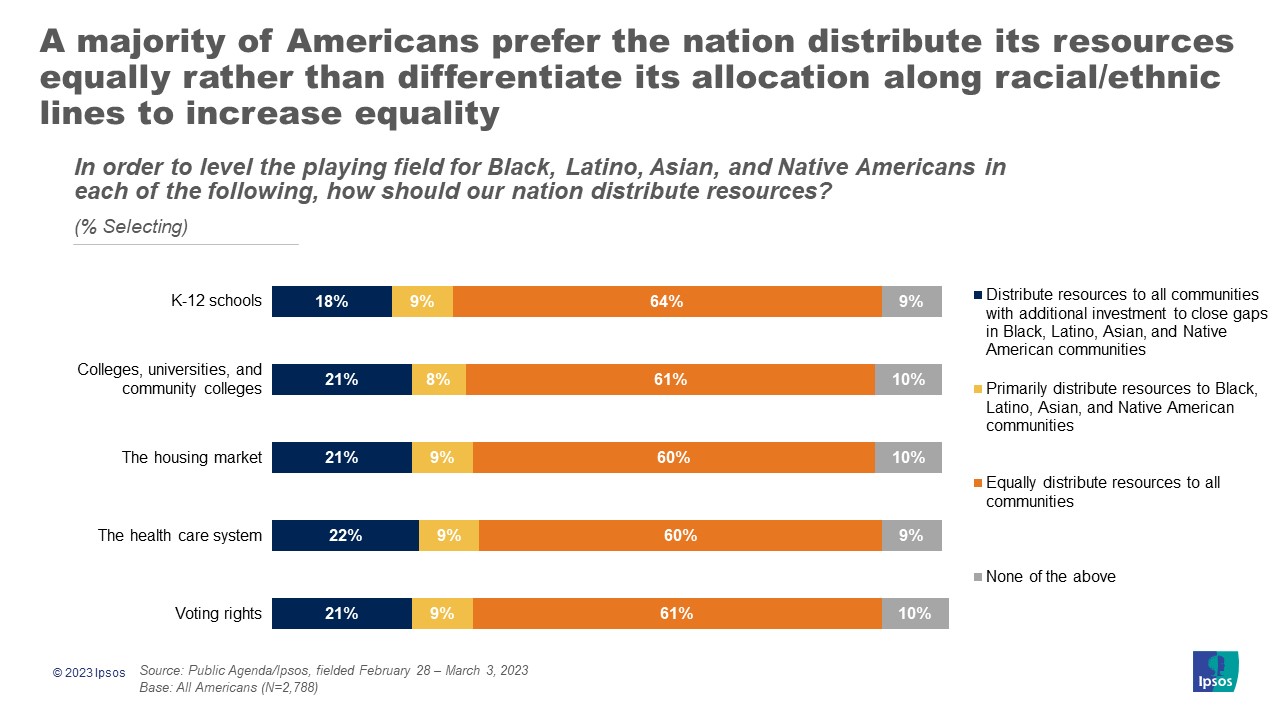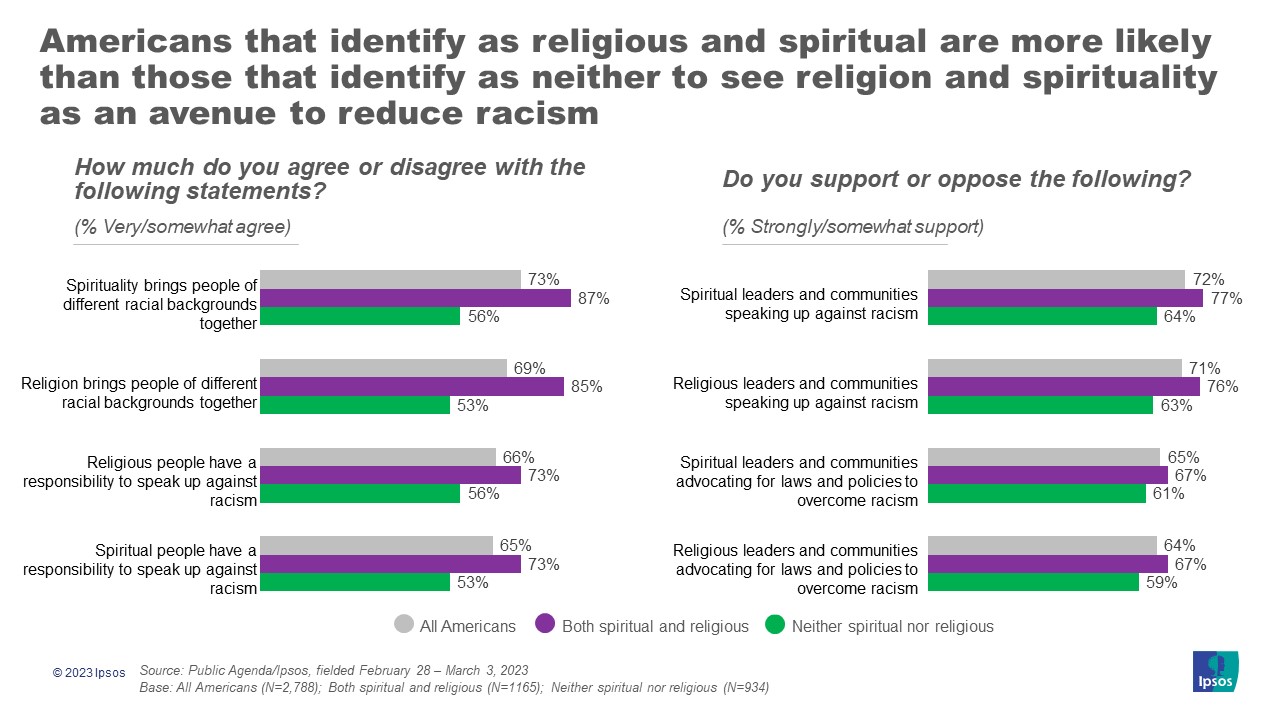Majority of Americans believe racism adds barriers to people of color’s success
New Public Agenda/USA Today/Ipsos poll also finds that many Americans view religion and spirituality as an avenue to reduce racism
Washington, D.C., June 15, 2023 – New Public Agenda/USA Today/Ipsos Hidden Common Ground poll examines the intersection between racism, religion, and spirituality in the United States. This poll finds that many American adults consider racism a serious problem and believe that individuals have the largest role to play in overcoming it, followed by governments and institutions like schools, colleges, and hospitals. However, for many, concerns exist around how white Americans will be impacted, about the distribution of resources involved, and whether elected officials are already doing too much to combat racism. Differences by spirituality and religiosity emerge in perceptions not only around taking action to combat racism but also about the effect of doing so on white Americans.

For more information about this study, please click here.
Detailed Findings
1. A majority of Americans believe that everyone has a role to play in making the world fairer and that all Americans—regardless of race or ethnicity—deserve an equal opportunity to succeed. However, opinions over the role of society and how to enact change differ.
- Americans are split 54% to 46% about whether society has a responsibility to care for people in need or whether individuals are responsible for themselves, respectively.
- Similarly, Americans are split 50-50 about whether the U.S. would be stronger if people speak up to change the system or if, instead, people respect authority and follow the rules.
- Despite these differences, a majority (64%) of Americans agree that everyone has a role to play in making the world fairer.
- Another nine in ten (91%) say all Americans, regardless of race or ethnicity, deserve an equal opportunity to succeed.
2. When it comes to race, most Americans think it is a serious problem that individuals treat Black, Latino, Asian, and Native Americans worse than white Americans. Nearly half of Americans believe racism is both a problem of how individuals treat each other and how society works.
- Nearly seven in ten (67%) say it is a serious problem that individuals treat Black, Latino, Asian, and Native Americans worse than white Americans. Two-fifths (39%) say it is a very serious problem.
- Three-fifths (63%) say racism makes it more difficult for people of color to succeed in America.
- Nearly half (49%) of Americans believe that racism is both a problem of how society works and how individuals treat each other. A quarter (26%) say it is mostly a problem of how individuals treat each other. These findings are similar to when asked in June 2020 (48% and 28%, respectively).
3. Americans believe individuals have the largest role to play in combatting racism, followed by governments and institutions like schools, colleges, and hospitals. Many view religion and spirituality as avenues for bringing people of different racial backgrounds together.
- About three-quarters (73%) of Americans say that individuals in their day-to-day lives have a role to play in overcoming racism.
- Following individuals, a majority say that the government (56%) — local and national — and institutions like schools, colleges, and hospitals (55%) have a role to play in overcoming racism.
- A majority believe not only that spirituality (73%) and religion (69%) bring people of different racial backgrounds together, but also that spiritual (65%) and religious (66%) people have a responsibility to speak up against racism.
- Further, nearly two-thirds of Americans support spiritual (65%) and religious (64%) leaders and communities advocating for laws and policies to overcome racism.
- Those that are both religious and spiritual are more likely than those that are neither to believe that spiritual (52% vs 39%, respectively) and religious (55% vs. 43%, respectively) leaders and communities have a role to play in overcoming racism.
4. While most Americans say individuals have a role to play in mitigating racism, they are wary about what that means in practice. For many Americans, concerns exist around how white Americans will be impacted, about the distribution of resources involved, and whether elected officials are already doing too much to combat racism.
- Americans are split 44% to 45% over whether efforts to combat racism make life more difficult for white Americans or not, respectively. The remaining 11% indicate that they do not know.
- When asked about distributing resources to level the playing field in K-12 schools, colleges, the housing market, the healthcare system, and voting rights, about three-fifths of Americans support distributing resources equally across communities. Only about one-fifth say the U.S. should distribute resources to all communities with additional investments to close gaps in Black, Latino, Asian, and Native American communities.
- A plurality (48%) of Americans oppose providing reparations to Black Americans whose ancestors were enslaved. Another 41% approve, while 12% say they do not know.
- About half (52%) of Americans say elected officials focusing too much on whether Black, Latino, Asian, and Native Americans are treated fairly is a serious problem.
5. Americans that identify as religious and spiritual are more likely than those that identify as neither to see religion and spirituality as an avenue to reduce racism. At the same time, this group is also more likely to report that people being too quick to accuse others of racism is an issue and that efforts to combat racism is impacting white Americans negatively.
- As shown in the graphic below, those that are both religious and spiritual are more likely than those that are neither to believe that religion/spirituality makes the country better and unifies people. They are also more likely to support spiritual or religious leaders engaging in the fight against racism.

- Half (52%) of Americans that are both religious and spiritual say that people being too quick to accuse others of racism is a serious problem, more than the 37% of Americans that are neither religious nor spiritual that say the same.
- This belief is more strongly held by Republicans (59%) than Democrats (30%), but across parties those that are both religious and spiritual are more likely to say it’s a serious problem than those that are neither.
- Those that are both religious and spiritual are more likely than those that are neither to agree that efforts to combat racism are making life more difficult for white Americans (52% vs. 36%).
- Again, this belief is more strongly held by Republicans (61%) than Democrats (31%), but across parties those that are both religious and spiritual are more likely to agree than those that are neither.
About the Study
These are some of the findings of an Ipsos poll, conducted between February 28 – March 3, 2023, on behalf of Public Agenda. For this survey, a sample of 2,788 adults age 18+ from the continental U.S., Alaska, and Hawaii was interviewed online in English. The sample includes 1165 both religious and spiritual individuals, 158 largely religious individuals, 531 largely spiritual individuals, and 934 neither religious nor spiritual individuals.
The sample for this study was randomly drawn from Ipsos’ online panel (see link for more info on “Access Panels and Recruitment”), partner online panel sources, and “river” sampling (see link for more info on the Ipsos “Ampario Overview” sample method) and does not rely on a population frame in the traditional sense. Ipsos uses fixed sample targets, unique to each study, in drawing a sample. After a sample has been obtained from the Ipsos panel, Ipsos calibrates respondent characteristics to be representative of the U.S. Population using standard procedures such as raking-ratio adjustments. The source of these population targets is U.S. Census 2019 American Community Survey data. The sample drawn for this study reflects fixed sample targets on demographics. Posthoc weights were made to the population characteristics on gender, age, race/ethnicity, region, and education. Party ID benchmarks are from recent high quality telephone polls.
Statistical margins of error are not applicable to online non-probability polls. All sample surveys and polls may be subject to other sources of error, including, but not limited to coverage error and measurement error. Where figures do not sum to 100, this is due to the effects of rounding. The precision of Ipsos online polls is measured using a credibility interval. In this case, the poll has a credibility interval of plus or minus 2.3 percentage points for all respondents. Ipsos calculates a design effect (DEFF) for each study based on the variation of the weights, following the formula of Kish (1965). This study had a credibility interval adjusted for design effect of the following (N=2,788, DEFF=1.5, adjusted Confidence Interval=+/- 3.8 percentage points).
The poll also has a credibility interval of plus or minus 3.5 percentage points for both religious and spiritual individuals, plus or minus 9.5 percentage points for largely religious individuals, plus or minus 5.2 percentage points for largely spiritual individuals, and plus or minus 3.9 percentage points for neither religious nor spiritual individuals.
The survey is trended with three surveys. The first one was conducted June 18-22, 2020, the second was conducted May 24-27, 2021, and the third was conducted August 24-26, 2022, all for Public Agenda by Ipsos. The June 2020 survey was conducted based on a nationally representative online sample of adults age 18 or older (N=1,113). The May 2021 survey was conducted based on a nationally representative online sample of adults age 18 or older (N=1,260). The August 2022 survey was conducted based on a nationally representative online sample of adults age 18 or older (N=2,219).
Further information about the June 2020 survey can be found here. Further information about the May 2021 survey can be found here. Further information about the August 2022 survey can be found here.
For more information on this news release, please contact:
Chris Jackson
Senior Vice President, US
Public Affairs
+1 202 420-2025
About Ipsos
Ipsos is one of the largest market research and polling companies globally, operating in 90 markets and employing over 18,000 people.
Our passionately curious research professionals, analysts and scientists have built unique multi-specialist capabilities that provide true understanding and powerful insights into the actions, opinions and motivations of citizens, consumers, patients, customers or employees. Our 75 solutions are based on primary data from our surveys, social media monitoring, and qualitative or observational techniques.
Our tagline "Game Changers" sums up our ambition to help our 5,000 customers move confidently through a rapidly changing world.
Founded in France in 1975, Ipsos has been listed on the Euronext Paris since July 1, 1999. The company is part of the SBF 120 and Mid-60 indices and is eligible for the Deferred Settlement Service (SRD).ISIN code FR0000073298, Reuters ISOS.PA, Bloomberg IPS:FP www.ipsos.com
![[WEBINAR] Innovation Reignited: How C-suite leaders can break through saturated, high-pressure markets](/sites/default/files/styles/related_more_insights/public/ct/event/2025-08/alchemy.png?itok=pdxip4SP)

![[WEBINAR] Brand America 2025](/sites/default/files/styles/related_more_insights/public/ct/event/2025-09/thumbnail-templates.jpg?itok=rg-5GRLi)